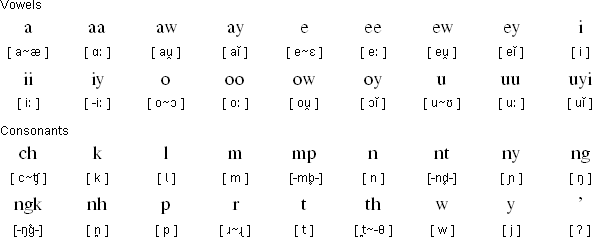Wik-Mungkan is an Australian language of the Paman group of the Pama-Nyungan language family spoken mainly at Aurukun on the west coast of Cape York Peninsula in the north of Queensland, Australia. The are about 400 native speakers of Wik-Mungkan, and a further 600 people who use is as a second language.
Wik-Mungkan is used in bilingual education in schools, a programme first introduced in 1973, then revived in 1993.

Transcriptions starting with a hyphen indicate that the letters appear only at the ends of words.
Information compiled by Wolfram Siegel
Information about the Wik-Mungkan language
http://en.wikipedia.org/wiki/Wik-Mungkan
http://www.everyculture.com/Oceania/Wik-Mungkan-Orientation.html
Alyawarr, Arrernte, Bundjalung, Dharawal, Dhuwal, Diyari, Djabugay, Djinang, Djinba, Gamilaraay, Gooniyandi, Gugadja, Guugu Yalandji, Guugu Yimithirr, Kala Lagaw Ya, Kalkatungu, Kaurna, Kuku Nyungkal, Kunjen, Kuuk Thaayorre, Lamalama, Martu Wangka, Ngaanyatjarra, Ngiyambaa, Nhangu, Noongar, Paakantyi, Pintupi, Pitjantjatjara, Warlpiri, Wemba Wemba, Wik-Mungkan, Wiradjuri, Yankunytjatjara, Yindjibarndi, Yolŋu
Languages written with the Latin alphabet
Page last modified: 23.04.21
[top]
You can support this site by Buying Me A Coffee, and if you like what you see on this page, you can use the buttons below to share it with people you know.

If you like this site and find it useful, you can support it by making a donation via PayPal or Patreon, or by contributing in other ways. Omniglot is how I make my living.
Note: all links on this site to Amazon.com, Amazon.co.uk
and Amazon.fr
are affiliate links. This means I earn a commission if you click on any of them and buy something. So by clicking on these links you can help to support this site.
[top]